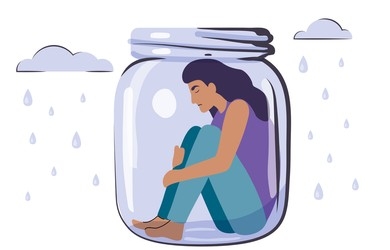Overthinking or Inner Knowing? Spotting the Signs
Author : Dr Tulika Shukla | 23 Jul 2025

Have you ever found yourself paralyzed by indecision, wondering if the uneasy feeling in your stomach is your gut trying to warn you or just good old anxiety messing with your head? If yes, you’re not alone. Understanding the difference between anxiety and intuition can feel like untangling fairy lights—frustrating and confusing, but oh-so-rewarding when you get it right. Let’s dive into this puzzling dynamic with a mix of science, real-life relatability, and a dash of humor.
The Nature of Anxiety
Anxiety is like that overly cautious friend who’s always expecting the worst-case scenario. It stems from fear—fear of making the wrong choice, of danger, or even of success (yes, that’s a thing!). It's future-focused, constantly reminding you about everything that could go wrong. Anxiety can keep you awake at night —it loves to shout, leaving you feeling unsettled and drained. Ever had a voice in your head scream, "Don't do it! You’ll regret it!" That’s probably anxiety disorder.
Common traits of anxiety:
- It’s loud and persistent.
- It thrives on overthinking and second-guessing.
- It creates physical sensations like sweaty palms, rapid heartbeat, or nausea.
- It often imagines catastrophic outcomes.
Here’s the catch: Anxiety often masquerades as intuition. Why? Because it’s convincing and stems from a desire to protect you.
What is Intuition?
Intuition, on the other hand, is that quiet yet confident voice within. It’s not shouting; it’s whispering. Think of intuition as your inner GPS. It’s based on patterns your brain has recognized subconsciously, along with subtle emotional and physical cues. Intuition is grounded in the present moment, and its messages feel calm and steady, even when they’re pushing you toward something difficult or risky.
Common traits of intuition:
- It’s calm and clear.
- It comes without overthinking.
- It feels right, even if it’s challenging.
- It’s persistent, but not pushy.
Unlike anxiety, intuition doesn’t thrive on fear but rather on clarity and alignment.
The Subtle Differences
So how do you tell them apart when both anxiety and intuition make your stomach churn? Here are some clues:The Feelings:
- Anxiety feels chaotic and overwhelming, like a storm brewing inside you.
- Intuition feels grounded, even if it’s urging you to act quickly.
The Source:
- Anxiety is fear-driven. It’s loud and based on "what if" scenarios.
- Intuition is neutral and present-focused, often just "knowing" without explanation.
The Aftermath:
- Acting on anxiety usually leaves you feeling drained or regretful.
- Acting on intuition often leaves you feeling at peace or validated.
Most times It’s Just Anxiety, Not a Gut Feeling
This is a big one! Anxiety can be so convincing that it feels like your gut is screaming for attention. But here’s a quick test: Does the feeling go away after you’ve calmed down or gained more information? If yes, it’s likely anxiety.
For example:
- You’re about to meet someone new, and your brain says, "They won’t like you. Don’t go." That’s anxiety, not your intuition warning you about a toxic person.
- You feel uneasy about sending a risky email. After re-reading and making minor tweaks, the feeling disappears. Anxiety again.
Your gut feeling (intuition) tends to persist until you act on it, and it won’t be riddled with worst-case scenarios. Trust me, intuition isn’t trying to ruin your sleep cycle—anxiety, on the other hand, will.
Building Your Inner Compass
Tuning into your intuition while managing anxiety takes practice. Here are some steps to help:
- Pause and Breathe: Take a moment to calm your mind. Deep breathing or a short meditation can help you separate your thoughts from your feelings.
- Journal It Out: Write down what you’re feeling. Anxiety will come across as fear-driven, while intuition will seem more like a soft nudge.
- Fact-Check Your Fear: Ask yourself, "What evidence do I have for this fear?" If it’s just speculation, it’s likely anxiety.
- Trust the Calm: Intuition often feels like an unshakable inner peace, even when the decision is tough.
- Practice Makes Perfect: The more you act on intuition and manage anxiety, the better you’ll get at distinguishing between the two.
Getting Help for Anxiety
If anxiety is dominating your decisions and clouding your ability to hear your intuition, seeking help can make all the difference. One of the most effective treatments for anxiety disorders and OCD is a type of behavioral therapy called Exposure and Response Prevention (ERP). Unlike traditional talk therapy, which can sometimes exacerbate symptoms, ERP is clinically proven to help the majority of people struggling with anxiety.
ERP works by helping you break free from the cycle of fear-driven behaviors. Instead of letting anxiety dictate your choices, this approach empowers you to make decisions based on your values, desires, and—yes—your intuition. With the guidance of a therapist trained in ERP, you’ll learn to resist safety behaviors and compulsions done out of anxiety.
For example, if you’re someone who double- or triple-checks the locks every night before bed, your therapist might start by encouraging you to check them only once. Then, they’ll help you sit with the discomfort of the "what if?" thoughts that follow. Over time, this practice allows you to regain control, trust your decisions, and feel confident living your life despite uncertainty and fear.
At first, ERP can feel challenging, even uncomfortable, but the rewards are immense. You deserve to live a life where anxiety doesn’t call the shots. With consistent effort and support, you’ll find yourself reclaiming control and reconnecting with your true self—the one guided by clarity and intuition, not worry.
Wrapping up
Understanding the difference between anxiety and intuition is like building a muscle—it takes effort, consistency, and a willingness to make mistakes along the way. Remember, your intuition is your ally, guiding you through the noise of fear. So next time you’re caught between a gut feeling and anxious thoughts, take a deep breath and ask yourself: "Am I afraid, or do I just know?" And don’t worry, if you get it wrong sometimes—that’s just part of the process. After all, even the best GPS recalculates every now and then. You’ve got this!






